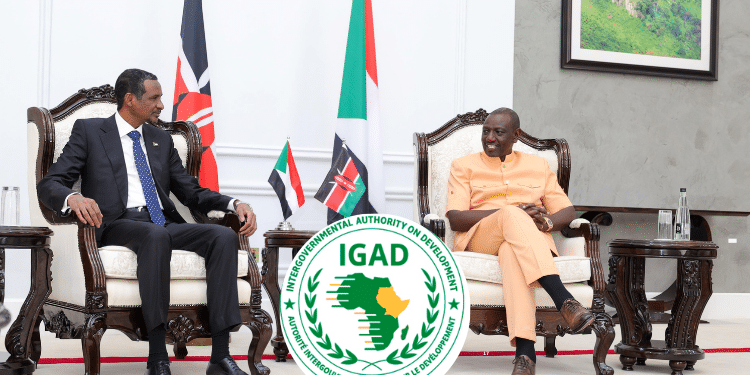Kenya launches National AI strategy with Ksh.152B implementation budget
ICT CS William Kabogo poses for a photo with other leaders during the launch of the Kenya National AI Strategy (2025-2030) at KICC, Nairobi on March 27, 2025.
The ICT Ministry has launched the national Artificial Intelligence strategy, a five-year plan set to position the country as Africas leader in AI innovation.
Speaking during the launch of the Kenya National AI Strategy (2025-2030) at KICC, Nairobi, ICT Cabinet Secretary William Kabogo underscored the need to strike a balance between leveraging AIs potential while simultaneously mitigating the risks from malicious use.
He said the strategy reflects the ambitious path Kenya will take in transforming the digital sector and providing solutions to the countrys challenges. "The question isnt whether we shall adopt AI but how we will shape it to keep Kenyas future-ready in the global digital economy. We must harness AIs potential to drive economic growth. This process must, however, be guided by ethical principles," he said. "AI is changing the nature of work. While some work will be automated, it will also create new job spaces."
Kabogo also proposed the idea of taking university students who have studied AI into the public service space. He promised to forward an AI Bill to Parliament within four months to regulate the sector.
The CS noted that if approved, the Bill would provide a framework for funding and regulation.
The report indicates that the government requires at least Ksh.152 billion to implement the AI strategy report by 2030, with AIs digital infrastructure requiring 50 per cent of the budget. "AI is not here to replace us but to enhance our potential. Our focus must be equipping our workforce with the right skills so that AI can be a catalyst in their operations," he added.
Dagoretti South MP John Kiarie echoed Kabogos sentiments and expressed confidence that the government would create digital hubs that would foster innovation in the community.
"Im looking forward to a great partnership. I see another opportunity for the democratization of AI strategy. We aim to develop 1,450 digital innovation hubs nationwide," the lawmaker stated.
Kabogo was joined by ICT Principal Secretary John Tanui, Diaspora Affairs PS Roseline Njogu, European Union ambassador to Kenya Henriette Geiger, Deputy Ambassador of the German Embassy in Kenya Alexander Fierley, Trans-Nzoia Senator Allan Chesang among others.
During the launch, international partners lauded Kenya for taking the initiative in developing the report. They called on collective action from all stakeholders to turn the strategy into a reality.
"The government brought together all stakeholders to ensure no voice was left out. Why? Because AI is too powerful to be left to a chosen few," Fierley stated.
"If we (Kenya and Germany) put our interests in terms of AI regulations, this can be a win-win situation for both countries. I call on everyone to own this vision."
AI is transforming various industries globally, and Kenya aims to be at the forefront of this revolution. The strategy outlines key focus areas such as AI-driven research, digital infrastructure development, and capacity building. By creating a regulatory framework, Kenya seeks to ensure AI development is inclusive and ethically guided.
One of the key pillars of the strategy is ensuring AI benefits all sectors, including healthcare, agriculture, education, and finance. AI-powered solutions have already begun making a difference, from automating processes to improving efficiency in public service delivery. However, stakeholders emphasize that AI must be deployed responsibly to avoid negative consequences such as job displacement and bias in decision-making systems.
The financial implications of the strategy are significant, with AI infrastructure alone accounting for half of the proposed budget. Policymakers stress that partnerships with private sector players and international organizations will be crucial in mobilizing resources.
Universities and research institutions are expected to play a crucial role in AI skill development. The government is exploring policies that will integrate AI education into curriculums at different levels, from primary schools to tertiary institutions. This approach aims to create a skilled workforce capable of innovating and competing in the global AI landscape.
Despite the optimism, challenges remain. Concerns around data privacy, cybersecurity, and ethical considerations must be addressed as AI adoption grows. Experts argue that a strong regulatory framework will help mitigate these risks while ensuring AI remains a tool for positive transformation.
Public awareness and participation are also vital in the AI journey. The government plans to engage communities through awareness campaigns, ensuring that AI solutions are accessible and beneficial to all citizens. This move aligns with the broader goal of digital inclusion and economic empowerment.
Kenya’s AI strategy reflects a broader shift towards a technology-driven future. With the right policies, investments, and partnerships, the country has the potential to lead Africa in AI innovation. The journey ahead requires collaboration from all stakeholders, ensuring AI serves as a catalyst for national development rather than a disruptor of livelihoods.
As the AI landscape evolves, continuous evaluation and adaptation of policies will be necessary. The government is keen on ensuring that the implementation of AI remains aligned with national interests while adhering to international best practices.
With the world increasingly embracing AI, Kenya’s proactive approach sets a precedent for other African nations. By fostering innovation, strengthening regulatory frameworks, and prioritizing ethical AI development, the country can harness AI’s full potential to
drive economic growth and societal progress.
















